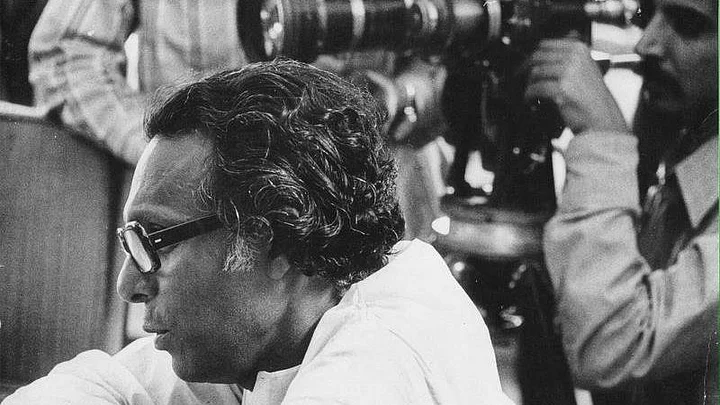The world film fraternity today lost a pillar of Bengali films with the passing away of Mrinal Sen. Proud to be a Marxist he was a bohemian by heart who provoked his audience to dream of bringing about change in the immediate Bengali society be it among the educated urbanites or the refugees from Purba Banga after the Partition of 1947, the marginalised suburban population or that of the rural poor .
In the words of Derek Malcolm, film critic and scholar and a for a long time was with The Guardian, as quoted by Dipankar Mukhopadhyay in his book Mrinal Sen: Sixty Years in Search of Cinema: ‘Sen traced the social and political ferment of India with greater resilience than any other contemporary Indian director.’ He was a maverick, the stormy petrel of Indian cinema to begin with, but he mellowed with age to make some very fine films, nuanced and layered and less political in approach.
Bengal has been blessed with many men and women with immense talent and soul. I can't help but wonder, has that era irretrievably passed? I should say I do know of Bengalis who are very talented artists, photographers and scientists. I also know a few others who I admire perhaps even more, whose creative work lies not so much in the arts or sciences as in designing and applying novel ways to make society a better place for all. Mrinal Sen, the doyen of parallel cinema in India, the maverick filmmaker, whose films were known for realistic depiction of the lives of ordinary people. He inspired many youngsters who where growing up in the 60s, 70s and 80s to take up filmmaking as an alternative yet a serious occupation.
Kolkata features prominently. He has shown Kolkata as a character, as an inspiration rather beautifully weaving the people, value system, class difference using the houses and roads of the city in his movies to showcase the coming of age Kolkata, his El-Dorado. He continued to experiment with the language of cinema narrative and has therefore left behind a distinct body of work for students of cinema to learn from. In Sen's later films, the audience becomes a participant in the process of the development of the plot. As the director he invites and provokes the audience into a shared process of forming multiple conclusions ... Neela Aakash er Nichey , Baishey Shravan ,Bhuvan Shome , Aakash Kusum , Padatik , Chorus , Calcutta 71, Mrigaya , Oka Ori Kaatha, Parashuram , Ek Din Pratidin , Kharij , Akaler Shandhane , Khandahar , Ek Din Aachanak , Aantareen , Genisis are just to name a few.
His real break was with Neel Akasher Neeche in the mid-'50s. Then followed Baishey Shravan and Akash Kusum. Bhuvan Shome was the turning point in film journey, making him a pioneer of the new wave in cinema in India.
Mrinal Sen was often branded as a political filmmaker, a term he resented. Sen would have preferred to be known as a filmmaker, whose films were a testament to human compassion and concern for the underprivileged. Despite the political labelling in the initial years, Sen remained a humanist and a compassionate soul. His concerns were humanistic and universal, though his way of expressing his concerns in his films might have been more direct and shorn of nuances at one time. His concerns for rural, village life and for the impoverished and marginal people, the urban underclass always remained. While making Akaler Sandhaney (In Search of Famine), he experienced a kind of compassion for people, which he felt was way above any technique of film making.
From his body of works, if one were to choose at least a few memorable films which would be remembered for long, the unanimous choice would be on Bhuvan Shome, Mrigaya, Ekdin Pratidin, Oka Oori Katha (in Telegu, based on Munshi Premchand’s famous story of Kafan), Khandhar, Ek Din Achanak. These movies are timeless classics, and are unique human documents, to be treasured for many, many years, and Sen’s reputation would rest firmly on these creations. In some of his later films, he was subtle and understated in exploring human emotions and in depicting even grim socio-economic realities, without trying to thrust one's ideas and worldview on the audience...
The maverick filmmaker, always unpredictable, but very pleasant and warm to meet, would be known for depiction of the lives of ordinary people, their struggles. His films were challenging the status quo and he was always the agent provocateur (Sen's words), coming up with passionate responses to the crises that the society faces, that the disadvantaged go through. Some of his later films, more mellow and nuanced, are masterpieces. He was truly a stormy petrel who mellowed with age and experience.
He loved his adda sessions with cutting across all age groups with innumerable cups of tea and cigarette . He loved smoking his pipe and talk about his childhood in Faridpur. With his leaving, an era has truly ended. Once forming the grand trio of Indian cinema with Ray and Ghatak, Sen was always very warm and pleasant and approachable, though he was quite unpredictable too, at times.
(This is an opinion piece and the views expressed above are the author’s own. The Quint neither endorses nor is responsible for the same.)
(At The Quint, we question everything. Play an active role in shaping our journalism by becoming a member today.)
